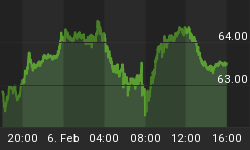Linear thinking often utterly misses the mark in financial forecasting.
Let's begin with a paradox: The one constant in our society is dramatic change. This is the main reason why projecting present conditions into the future often fails.
"If someone had asked you in 1972 to project the future of China, would anyone have said, in a single generation, they will be more productive than the United States and be a highly capitalist country?
"Project the U.S. space program in 1969, in fact many people did -- there are plenty of papers you can read from 1969 to 1970 saying, well, it's obvious at this pace we'll both have colonies on the Moon very soon and we'll have men on Mars...
"One could just as well ask someone to project, say, the Roman stock market in 100 A.D. I doubt if you'd have found anyone who said, well, it's essentially going to go to zero."
-- Robert Prechter at the London School of Economics, lecture "Toward a New Science of Social Prediction."
Examples of linear thinking may be well-known like the ones above, or they may happen in our individual spheres. Mom sees Johnny eating animal crackers Monday, Tuesday and Wednesday. The box is now empty. She buys more -- but the box remains unopened for days. Johnny wants a break from animal crackers. It's an elementary example, but a demonstration of linear thinking nonetheless.
The socially awkward classmate you knew in high school is now the boss of the former class president who was dubbed "most likely to succeed." Projections for both of their futures would have widely missed the mark.
SUVs are selling like snow cones on an August afternoon in Luckenbach, Texas... "let's make more," says Detroit. "Dramatic change" takes over in the form of sky-high gas prices followed by a recession and a social distaste for excess -- and SUV sales sink.
Point is: When it comes to your money, pay attention to the pitfalls of linear thinking.
The markets of today may not resemble the markets of tomorrow.
Keep in mind the concept of dramatic change. This cannot be over-emphasized and bears repeating: Major change is not an occasional occurrence throughout history; paradoxically, it's the only constant.
Even with the benefit of reviewing the above examples, it can be difficult to imagine, ahead of time, a future which is strikingly different from the present. But you must leave your mind open to such a possibility -- nay, probability.
Elliott Wave International believes the stock market in the immediate years ahead will probably show big price changes. The foundation for that forecast is the Elliott Wave Principle, which is based on decades of market observation and proven mathematical patterns -- not linear projections.
"...Elliott can prepare you psychologically for the fluctuating nature of price movement and free you from sharing the widely practiced analytical error of forever projecting today's trends linearly into the future. Most important, the Wave Principle often indicates in advance the relative magnitude of the next period of market progress or regress." -- Frost and Prechter, The Elliott Wave Principle
What is the magnitude of the next market period likely to be?
You may be astonished to find out if you've been thinking "linearly" up until now.
Remove dangerous linear thinking from your investment process -- download the free 118-page Independent Investor eBook. The Independent Investor eBook shows you exactly what moves markets and what doesn't. You might be surprised to discover it's not the Fed or "surprise" news events. Learn more, and download your free ebook here.















